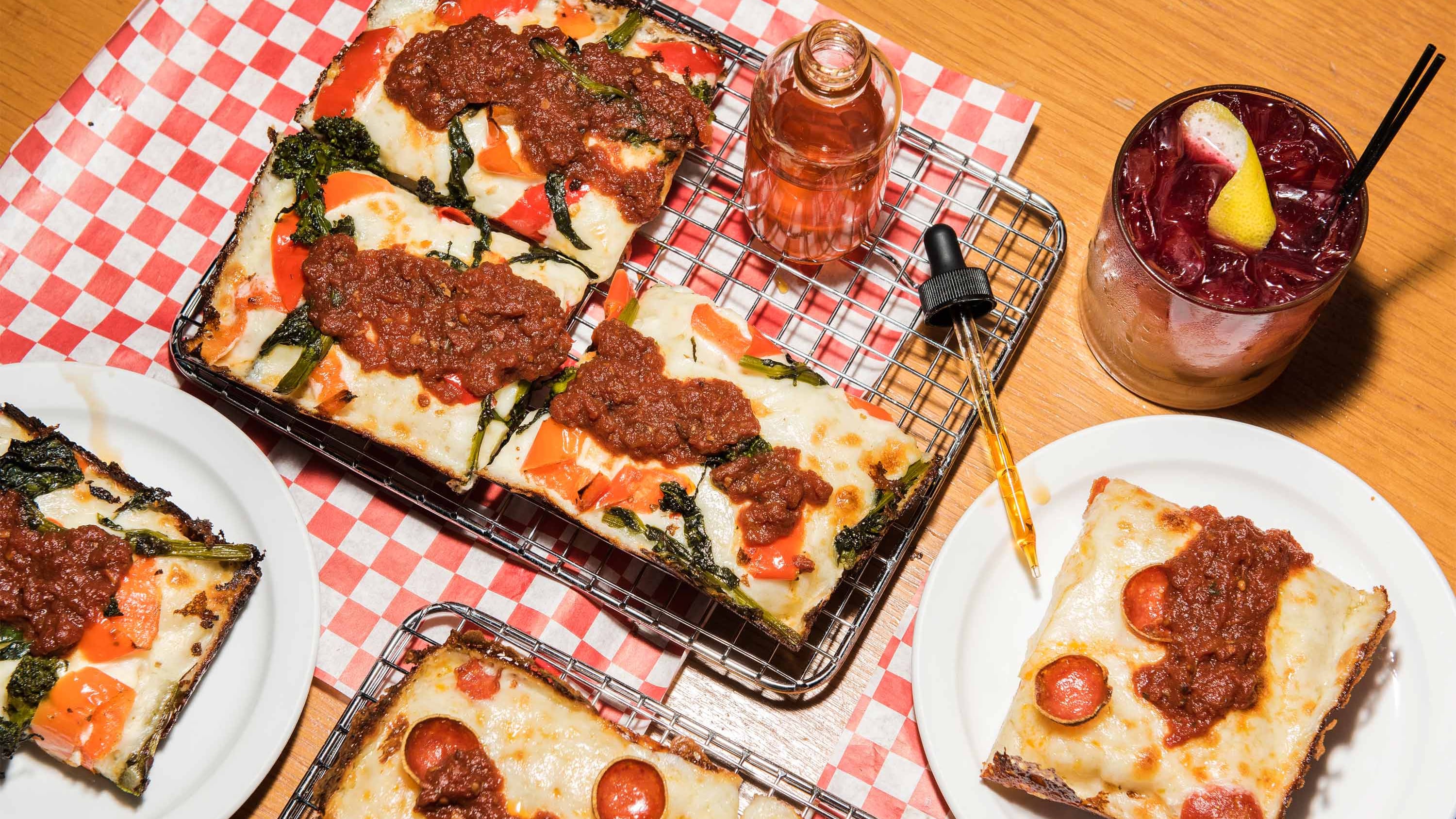When our events team started planning the follow-up to Pie Hard, there was no question what the focus of this year's pizza-and-pie party should be.
Deep-dish pizza—Detroit style, Nonna style, grandma style—is all the rage right now. In Portland, we've seen it pop up all over town. Even the city's two greatest piemen, Ken Forkish of Ken's Artisan and Brian Spangler of Apizza Scholls, are working on their own versions, though neither is ready for prime time yet. In Seattle, the hottest new pizzeria, Dino's Tomato Pie, does it deep. Even in New York, squares are hip, as Emily pizzeria in Brooklyn has drawn raves as Food & Wine magazine declares that "Grandma Pie Is the New York Slice You Need to Eat Right Now."
Why is deep-dish pizza en vogue? We debated it as we get ready for Pie Harder—WW's deep-dish pizza fest at Ecliptic Brewing on August 29.
Matthew Korfhage: Honestly? I think people are tired of the reverence for crumb structure and char, the loyalty tests between Neapolitan and New Haven, the whole semi-fancy notion of pizza that suddenly attacked every neighborhood in Portland.

Martin Cizmar: And I completely disagree. I think people have become so knowledgeable about pizza, and the reverence for well-made wood-fired pies has become so widespread that foodie types want something new—and this is it. They still like fancy pies, and they see these as fancier pies.
MK: I'm less optimistic about the nobility of Portlanders' desires—deep dish is comfort pizza, whether Detroit or Chicago.
MC: First of all, how is all pizza not comfort pizza? Did someone serve you a deconstructed, modernist pizza that had, like, no dough and the pepperoni was made of foraged mushrooms? But beyond that, I disagree with you conflating Detroit and Chicago. Everybody in America understands deep-dish Chicago pizza at this point. It's a niche food—it has a place, but it's not the same phenomena as these Detroit pies and grandma pies.
MK: No, Detroit is not Chicago. All things Chicago are ruined by people from there telling you the Italian beef or Chicago dog you have elsewhere is terrible: It is a city of failed ideals. Detroit just wants to party. There's a looseness to Detroit pizza—to my knowledge, most of the stuff here wouldn't even be claimed by Detroit. In Portland, "Detroit pizza" just feels like pizza-flavored pizza.

MC: Well, yes, Detroit claims it. Like Chicago, there's an extreme "red top" version in a cast iron and all that, and then things that are along the same lines which are less distinct. I think all the new Portland deep dishes are on that spectrum. It's not like they're doing the same thing as Flying Pie in Montavilla.
MK: Right, there's the Gus Guerra pie. The ur-Detroit. But a lot of what we're willing to call Detroit pizza is sort of an improvisation on that. East Glisan feels pretty faithful.
Related: Detroit Style Pizza is the New Hotness. We Found the Best in Portland
MC: Well, they studied the Detroit pies and spent a long time re-creating them. Pizza Jerk modeled theirs on New Jersey, but they're the same thing: Sicilian pies that are baked in pans. That's what makes them what they are.
MK: Yes, but let's not assume the mass food populace is sitting there thinking about the precise acidity of the sauce and funkiness of the cheese. These Sicilian pies are where talented chefs are turning their attention, after a spot in Seattle got nuttily popular. But fundamentally it's a cheesy, thick-crust pan pie in a city where we've been told we're supposed to want thin-crust char, with a buzzy imprimatur of novelty that makes it something to chase. People wanted thick crust, and have now been given license.
MC: Your argument is that in their hearts, people always wanted thick crust, but they were tricked into pursuing thin crust because they were told it was sophisticated?
MK: My argument is that thick crust is an indulgence, and there's a simple satisfaction in it that is almost childlike. I get what you're saying about complexity in the interplay of ingredients, but I don't think it's artisanal food education that makes people like it. It's probably not nostalgia either—most here haven't had Sicilian style before. But it's a very visceral deliciousness you don't have to think about very hard. It's probably just a pendulum swing: The last national thick-pizza fad was Chicago, decades ago, when I merely heard rumors about New Haven pizza. This time when the pendulum swung thick, it hit in a different spot.
MC: I guess that's a fair way to put it. To me, the interesting thing is that we're diving deeper and exploring unfamiliar types of pizza. We're getting more regional, which is awesome. There are so many American foodways that have not gotten attention. Maybe St. Louis pizza will be next!
MK: Dear lord, I hope not! I still have nightmares about Provel "cheese."
Pie Harder will offer up deep-dish pie slices from Baby Doll, Ex Novo, East Glisan, Pizza Jerk, Ranch and Via Chicago, plus sweet pie from Baker & Spice, Petunia's Pies and Pastries, and Ecliptic. It will take place later this month, at Ecliptic Brewing, 825 N. Cook St., 503-265-8002, eclipticbrewing.com. 5-9 pm. $27. Tickets at bit.ly/Pieharder.


